PRIO Events
All Episodes
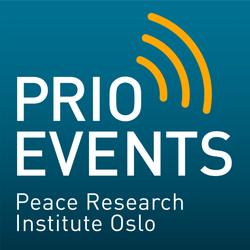
Fractured Order, Rising Influence: Southeast Asia and China’s Digital Ambitions
01:26:31|As the global balance of power shifts, Southeast Asia finds itself at the crossroads of economic transformation, technological advancement, and strategic realignments. One key element in this evolving landscape is China’s Digital Silk Road (DSR), a crucial component of the Belt and Road Initiative (BRI) aimed at positioning China as the global technological superpower. This initiative promises to reshape the global digital order and could trigger a technological and normative rift with far-reaching geopolitical consequences.In this episode, recorded live at PRIO, a panel of regional experts and researchers unpack the findings of a three-year project examining China’s digital technology exports to Malaysia, Indonesia, and the Philippines. How are these countries managing the promises and perils of digital infrastructure tied to Beijing’s ambitions? And what does it mean for sovereignty, governance, and global power?From infrastructure and internet governance to normative influence and political risk, the conversation offers a comparative look at how Southeast Asia is responding to China’s rising digital influence.Speakers:Dr. Ilaria Carrozza, PRIODr. Cheng-Chwee Kuik, Universiti Kebangsaan MalaysiaJulio Amador III, Ateneo de Manila UniversityHabib Abiyan Dzakwan, CSIS IndonesiaChair: Nic Marsh, PRIO🎙️ Tune in for a sharp, regionally grounded discussion on China’s Digital Silk Road and the digital futures of Southeast Asia.
What Limits Should Be Placed on the Use of AI in Warfare?
01:20:09|There has been a steep increase in the reliance on AI tools for warfighting. This is unsurprising as AI allows for increased speed on the battlefield, better surveillance, tracking, target identification and validation, as well as more data-driven decision support both for identifying capabilities and for target selection. The increased reliance on AI has fueled a push for more weapons’ autonomy on the battlefield.These changes to the way wars are fought have led to a range of ethical concerns around the use of AI for life-or-death decisions on the battlefield. In this episode, recorded live at PRIO, a panel of experts explores the implications of AI-driven warfare. What does it mean to delegate life-or-death decisions to algorithms? How should states and societies respond to this accelerating trend?Panelists:Eivind Vad Petersson, State Secretary, Norwegian Ministry of Foreign AffairsJovana Davidovic, Senior Researcher, PRIOMitt Regan, Professor of Law, Georgetown UniversityModerator: Greg Reichberg, PRIO🎙️ Tune in for a thought-provoking discussion on the intersection of AI, ethics, and modern conflict - and what’s at stake as the line between human and machine decision-making continues to blur.
From Shock to Strategic Thinking: What Now for the Aid Sector and a Leading Donor Like Norway?
01:34:57|2025 marks a turning point for the global aid sector. While many donors are pulling back, Norway is charting a different course - reaffirming its commitment to flexible, principled funding and the strategic use of aid as soft power.In this episode, recorded live at PRIO, a panel of leading scholars and practitioners explore how the current crisis in global aid might serve as an opportunity for transformation. Are we witnessing a reformist recalibration or a call to radically rethink the entire system?From debates around localization and institutional memory to the role of evidence-based approaches and equitable participation, the conversation tackles the big questions shaping the future of aid.Speakers:Erik Abild, NORADØyvind Eggen, ArtikulertGry Ballestad, Norwegian People’s AidOle Jacob Sending, NUPI & Centre for GeopoliticsSimon Reid-Henry, PRIOKristin Bergtora Sandvik, University of Oslo and PRIOChair: Maria Gabrielsen Jumbert, PRIO🎙️ Listen now for an unflinching discussion on the ideas, tensions, and actors shaping the future of global aid - and Norway’s place within it.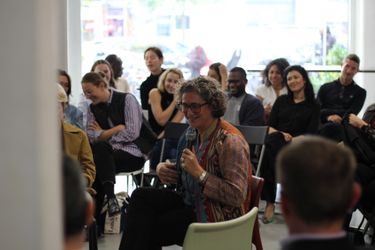
Transforming Society Through Community-Engaged Research: A Conversation with Halleh Ghorashi
01:07:39|Listen to this inspiring seminar with Professor Halleh Ghorashi, a leading scholar in diversity and inclusion at Vrije Universiteit Amsterdam (VU). She shared how her understanding of engaged scholarship has evolved throughout her academic journey, highlighting its impact on academia, society, and refugee communities.Drawing from her work with the 'research within expertise' lab: Refugee Academy at VU, Professor Ghorashi showcased how engaged scholarship can drive meaningful change. Critical theory and feminist epistemology have been central for her in approaching engaged scholarship from a transformative angle.In conversation with PRIO Researcher Cindy Horst, Professor Ghorashi explored her work of co-generating societal change towards increased diversity and inclusion in the Netherlands. Her transformative engaged scholarship conceptually draws on epistemic justice and builds on methods of co-creating various forms of knowledge with communities.SpeakersHalleh Ghorashi is Professor of Diversity at VU. She proposes a critical approach of diversity and inclusion and shows the importance of the perspectives of migrants and refugees through narrative methodology in creating more inclusive structures.Cindy Horst is a Research Professor in Migration and Refugee Studies and co-director of the PRIO Centre on Culture, Conflict, and Co-existence. She is the author of Creative Resistance. The social justice practices of Monarch, Halleh and Diana (Lived Places Publishing, 2023), which includes a chapter about Halleh Ghorashi.The event is co-organized by the PRIO Migration Centre and PRIO Centre on Culture, Conflict and Coexistence.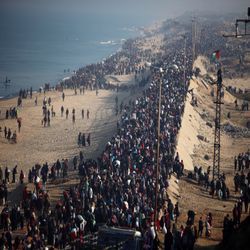
Law on the Frontlines in Palestine – A Conversation with UN Rapporteur Francesca Albanese
01:00:17|PRIO was pleased to invite to a seminar with Francesca Albanese, the UN Special Rapporteur on the Occupied Palestinian Territories. In this seminar, Albanese shared her firsthand experiences and insights from her work, focusing on the significant legal and political challenges facing the UN in Palestine.The seminar addressed several key issues, including the challenges surrounding the UN’s access to the occupied Palestinian territories, the humanitarian implications of the ban on UNRWA, and the ongoing cases before the International Court of Justice (ICJ) related to genocide and humanitarian aid access. Albanese also provided an update on the situation in Gaza and the West Bank, and reflected on the potential of removing Israel’s seat at the UN in response to violations of international human rights law.The conversation was moderated by Jørgen Jensehaugen, Senior Researcher at PRIO.This event was a collaboration between the Peace Research Institute Oslo (PRIO) and Palestinakomiteen Norge.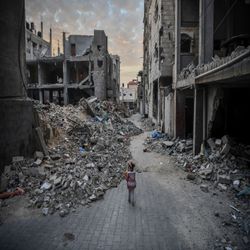
The Gulf States Thinking on Reconstructing Gaza
59:24|Once the war in Gaza ends, the narrow strip of land will require a massive reconstruction effort of unimaginable proportions. Large questions remain, such as who will pay? What political conditions can the reconstruction happen under?To help us understand some of these questions, with reflections from the Arab Gulf, PRIO hosted Ghassan Elkahlout, Palestinian scholar and Director of the Center for Conflict and Humanitarian Studies (CHS) in Doha.Tor Wennesland, PRIO Practitioner in Residence.Jørgen Jensehaugen, Senior Researcher, PRIO.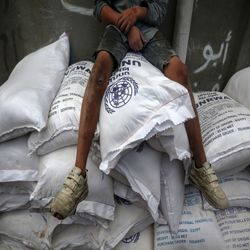
The Role of Local Humanitarian Actors in a Middle East under Transformation
01:15:20|As war and humanitarian crises unfold in Gaza, Syria and Lebanon, a new Middle East is emerging. How can local humanitarian actors rise to the challenge? What role do they play in addressing urgent needs, fostering long-term solutions and promoting reconciliation amidst turmoil? And how can they navigate the complexities introduced by the recent UNRWA ban?SpeakersKaram Abi Yazbeck, Regional Coordinator for Caritas Middle East and North Africa, sharing first-hand testimony directly from the groundJørgen Jensehaugen, Senior Researcher at the Peace Research Institute Oslo, providing a snapshot of the region's shifting geopolitical landscape and the implications of the UNRWA banRaymond Johansen, Secretary General of Norwegian People's AidArne Næss-Holm, Director of International Programmes, Norwegian Church AidIngrid Rosendorf Joys, Secretary General, Caritas NorwayThe discussion was moderated by Cindy Horst, Research Professor, Peace Research Institute Oslo (PRIO).This event was a collaboration between the Peace Research Institute Oslo (PRIO), Caritas Norway, Norwegian People's Aid and Norwegian Church Aid.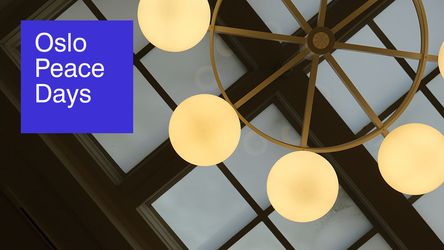
The Democratic Peace in a Geopolitically Changing World
58:31|In light of the shifting geopolitical landscape, the long-standing theory of democratic peace - asserting that democracies rarely wage war against each other - is facing critical scrutiny.This panel will discuss whether this principle still holds true in an era marked by shifting power dynamics, rising authoritarianism, and the erosion of liberal democratic norms.With conflicts increasingly shaped by hybrid warfare, economic rivalries, and regional instability, the traditional correlation between democracy and peace may be weakening.This discussion will explore whether contemporary democracies are more prone to conflict, or if the theory needs to be redefined for a multipolar world. The panel will also revisit Francis Fukuyama's "End of History" argument, which predicted the triumph of liberal democracy as the final form of human governance.As new global players and political ideologies emerge, panelists will assess whether this notion is still relevant, or if we are witnessing the rise of new patterns of conflict that challenge the foundations of democratic peace.SpeakersMs. Hilde F. Johnson, European Institute of PeaceProf. Carl Henrik Knutsen, University of OsloDr. Marianne Dahl, Peace Research Institute OsloThe discussion will be moderated by Dan Banik, Academic Director of Circle U's democracy hub.This event is part of Oslo Peace Days 2024. Follow this link for full programme.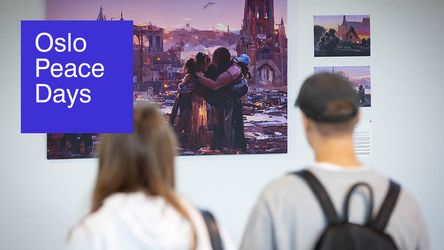
AI in War & Peace: The Politics of Truths and Fakes
01:14:40|AI shapes war, humanitarian emergencies and the roads to peace. Ongoing conflicts are also experimental laboratories, creating a boom in AI weapons systems.Before and during the Gaza war, AI-generated imagery and text has contributed to diametrically opposed versions of a ‘truth’ about violence, the plight of civilians and the intentions of humanitarian actors. While responding to hurricanes Helene and Milton, US authorities also struggled against AI generated imagery manipulating understandings about the danger and impact of the disaster and government assistance.In 2024, there are 120 armed conflicts around the world. Peace processes require finding shared grounds of knowledge. AI may be a double spoiler – heightening tension and eroding trust. This panel looks into the relationship between military technology and humanitarian law, how we understand claims about civilian suffering and societal devastation to be true – or not – and the impact of dis and misinformation on efforts to create pathways towards peaceful solutions.SpeakersKristin Bergtora Sandvik, University of Oslo and Peace Research Institute Oslo (PRIO)Morten Tønnessen-Krokan, the Norwegian Red CrossOlav Østrem, faktisk.noThe discussion was moderated by Maria Gabrielsen Jumbert, Senior Researcher, PRIO.This event was collaboration between PRIO and the University of Oslo, and a part of Oslo Peace Days 2024.
loading...